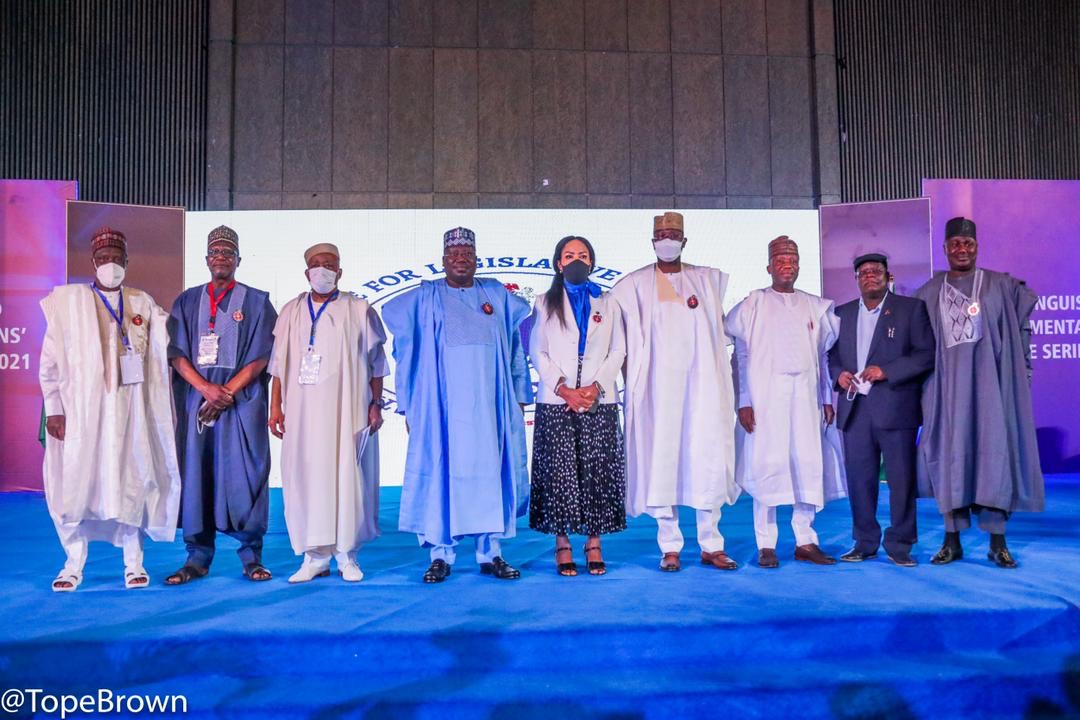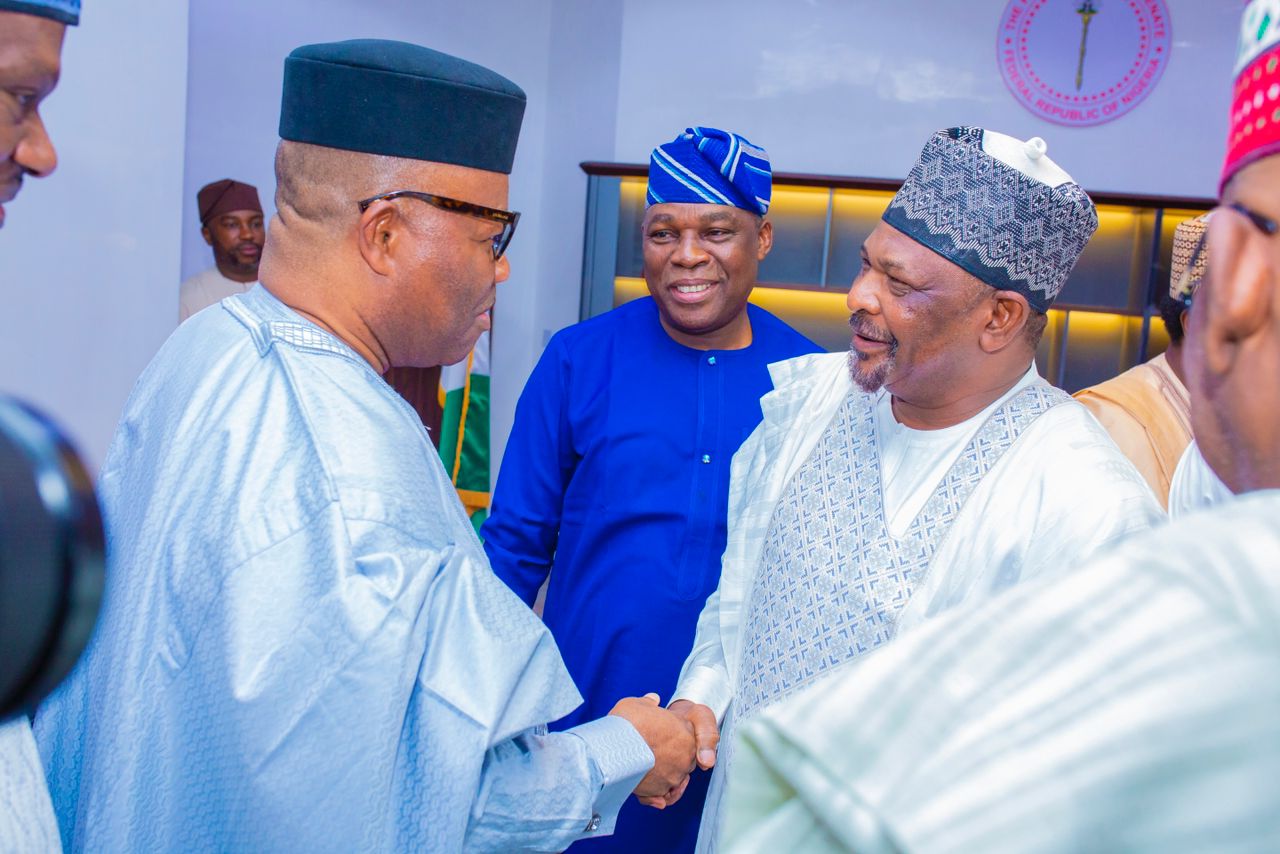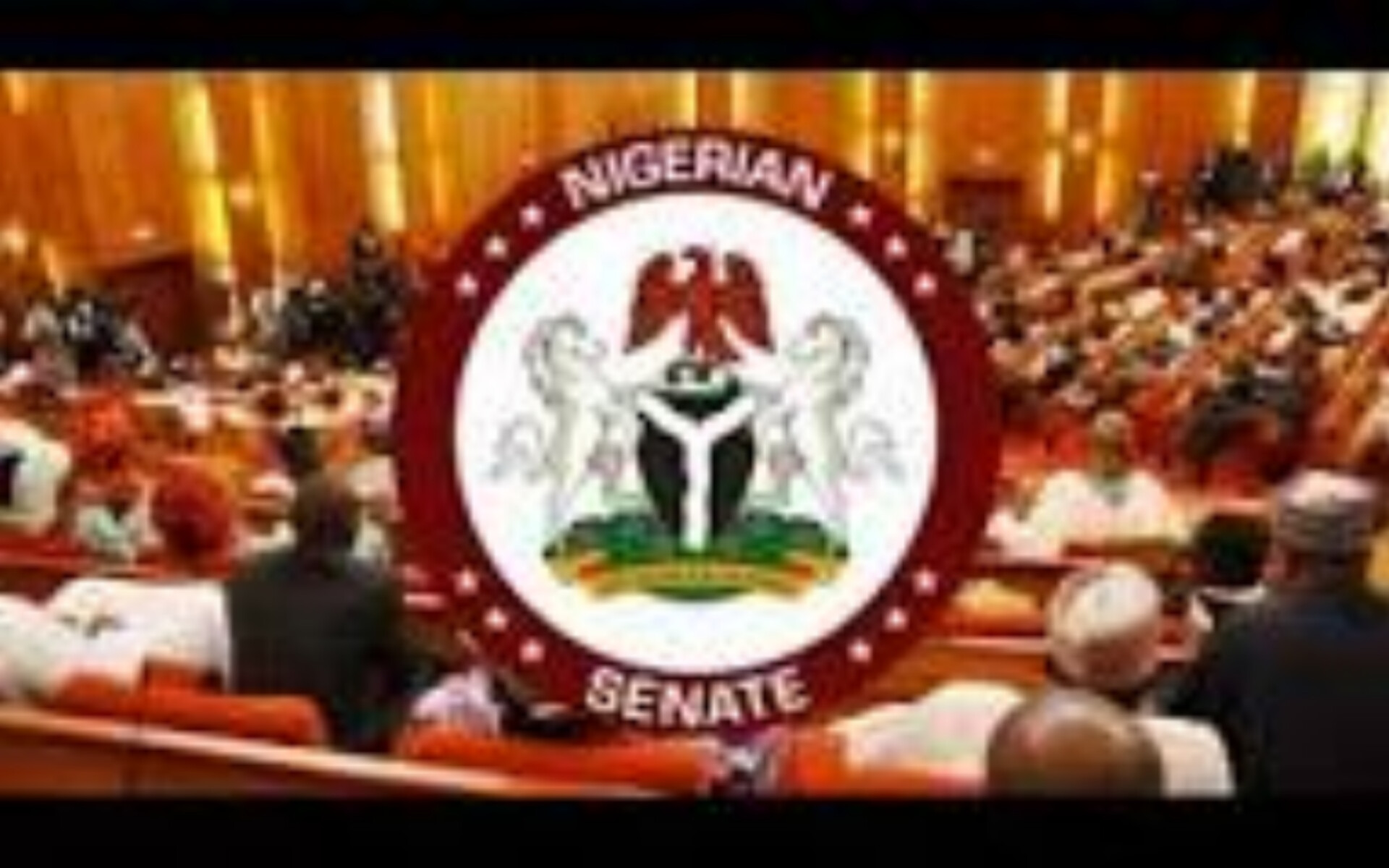Legislature
Senate president reveals Salaries, emoluments of Federal lawmakers

***clears some misconceptions of the public about NASS
The President of the Senate, Ahmad Lawan on Monday tried to clear some common misconceptions about the legislature that has become entrenched and difficult to change in Nigeria.
After many years of confusion and figure fixings, Lawan on Monday revealed salaries and emoluments of Federal lawmakers to the public in Abuja
This was as he declared that President Muhammadu Buhari has done better than his predecessors on assents Bills.
Speaking in a paper presented at the First Distinguished Parliamentarians Lecture Series organised by the National Institute for Legislative and Democratic Studies ( NILDS), the President of the Senate said monthly Salary of a Senator is N1.5million while that of a member of House of Representatives is N1.3million.
He said the N13 million thrown into the public space few years back as monthly salary of a Senator was quarterly office running allowance.
“The quarterly office running allowance for legislators Is what Is erroneously conflated with a monthly income to create confusion and mislead the Nigerian people.”
According to him, the average office running cost for a Senator is about N13 million while that of a member of the House of Representatives is N8 million.
This he said is to cover the cost of local/international travel and transport, consulting of professional service, medical services, office stationaries/computer consumables, books, newspapers,’ magazines and periodicals, maintenance of motor vehicles and office equipment and constituency outreach, among others.
“
Arithmetically , N13million office running cost for a Senator amounts to N52million a year while the N8million for a member of the House of Representatives , amounts to N32million in a year.
Another issue that has contributed to abiding poor perception of the National Assembly he said is that of salaries and emoluments of legislators which he said are approved by the Revenue Mobilisation, Allocation and Fiscal Commission (RMAFC).
He said it is included in the budget allocated to the National Assembly,
“This is one of the lowest of any presidential democracy in the world.”
Lawan also picked the subject of the National Assembly’s budget which he tagged as the most persistent and vexatious that has dented the image of the National Assembly.
He said the widespread presumptions remain that the budget of the National Assembly is not known.
“It is well known that the budget of the National Assembly, which has never risen above N150 billion since 1999 is a fraction of the budget of the federal government, much less than the budget of some ministries in the executive.”
According to him, the aggregate budgets approved for NASS from 2005 to 2021 and the relative shares in the national budget trended upwards from N54.8 billion in 2006, except in 2009, peaking at N154.369 billion in 2010. “Thereafter, it stabilized at N150.0 billion each year. In 2015/2016 and 2019 however, the aggregate allocation to the National Assembly dropped to N120 billion and N115 billion respectively.
“In relative terms, the budget allocation to the National Assembly declined from 4.1 per cent of the total federal budget in 2008 to 1.90 per cent in the 2016 fiscal year.
“However, in the last four years, the percentage of the National Assembly budget in the federal budget ranged between 0.82 (2021) to 1.44 (2019) per cent of the Federal Government budget.
“The National Assembly, on average, accounts for 2.81 per cent of the national budgetary allocation over the six years between 2011 and 2016, and much less in the last two years. “Between 2011 and 2014, the National Assembly attracted an annual budgetary allocation of
N150 billion, which is about 3 per cent of the total budgets for those years.”
Explaining further he said the budget of the National Assembly has actually has actually reduced despite the growing complexity and expansion in the operations of the legislature
On constituency projects and zonal intervention projects have generated a lot of controversies. “Regrettably, a lot of what has been said is based on a limited understanding of how these projects work. It is a system that allows legislators to nominate projects for implementation in their respective constituencies. “Legislators themselves do not implement these projects. However, in line with their legislative mandate, they exercise oversight over the process.
“I am the first to agree that we need a sustainable framework for the management of these projects after completion.
“This should include formal handing over to the States or Local Governments for maintenance.”
He said the purchase of Operational Vehicles for use of legislators has also received extensive media attention.
” The argument against the purchase of official vehicles for legislators is at best counterintuitive and at worse malicious and intended to tum the public against lawmakers. If civil servants from the rank of assistant director and above are entitled to official vehicles and
“Some ministers have a convoy of cars, why is the allocation of a Toyota Camry to Members and a land cruiser such a hideous proposition.”
He said the current National Assembly is the most successful in law making since the return to civil rule in 1999.
The Senate President said the focus of the ninth National Assembly had been on legislations that are most likely to impact either on the democratic Institutions, economy, security or the livelihood of Nigerians.
“I dare say that the ninth Assembly has been the most successful in the area of lawmaking since 1999.
“We have broken many ‘jinxes’ and done many ‘firsts,’ overcoming traditional obstacles through consensus building and clever political brinkmanship,” Lawan said.
The Senate President said as of November 2021, about 2,500 Bills had been introduced in the National Assembly – 769 in the Senate and 1,634 in the House of Representatives.
“However, as I have repeatedly maintained, for us in the 9th Assembly it is not so much the number of bills as it is quality.
“We have focused our energy working on legislations that have a realistic chance of being assented to as well as those that have the potential to impact most on the lives of Nigerians,” Lawan said.
He said President Muhammadu Buhari led-APC had been the most proficient in granting assent to Bills stressing that available data on gazetted Acts showed that between 2015 and 2021, President Buhari had assented to more than 84 Bills, the highest since 1999.
The Senate President said the projection was that the figure would be significantly higher before the end of Buhari tenure in 2023.
From the available data displayed by the Senate President, President Olusegun Obasanjo signed a total of 82 billed into law between 1999 and 2006, President Umaru Yar’Adua signed 38 bills into law between 2007 and 2009 while President Goodluck Jonathan signed 40 bills into law between 2010 and 2915.
“For twenty years, the National Assembly had attempted reforming the petroleum industry without much success.
“It was first introduced in the 6th Assembly (2007-2011) but failed to scale through. Similar efforts by the 7th Assembly failed to secure concurrence by the Senate while in the 8th Assembly, the Bill was passed but failed to secure presidential assent.
“In the 9th Assembly, we prioritised the Bill in our legislative agenda and worked closely with the Executive to secure passage and assent.
“This historic achievement of the National Assembly means that Nigeria now has legal, governance, regulatory and fiscal frameworks for the petroleum industry that would promote optimal utilisation of the country’s abundant oil and gas resources.
“It will also enhance social and economic development and promote a conducive investment climate in the industry and foster the development of host communities.

Legislature
Senator Ningi resumes from suspension

After staying away for 75days out of 90 days suspension slammed on him by the Senate on March 12, 2024, Senator Abdul Ningi ( PDP Bauchi Central), formally resumed legislative activities at the Senate on Tuesday in plenary.
On the strength of motion sponsored by the minority leader Senator Abba Moro on behalf of minority caucus, the Senate recalled Senator Ningi from the three months suspension
Recall that Senator Ningi was suspended by the Senate at the committee of the whole on 2024 budget padding allegation leveled against the Senate during interview he had with the BBC Hausa service.
The Senate had recalled the Lawmaker representing Bauchi Central, Abdul Ningi after 2 Months and two weeks of the 3months suspension slammed on him over his interview in which he alleged padding of the 2024 N28. 7tn budget.
The lawmaker was suspended on the 12th of March, 2023 for three months, but the Senate on Tuesday unanimously resolved to recall their colleague from suspension.
Recall that, Senator Olamilekan Adeola had come under Orders 9, 10, 41, and 51 to move a motion of privilege and issue of national importance against Ningi over his interview with the British Broadcasting Corporation (Hausa Service).
Ningi had, in the interview alleged that the budget passed by the National Assembly for the 2024 fiscal year is N25tn while the one being implemented by the Presidency is N28.7tn.
The motion, for the unconditional recall of Senator Abdul Ningi was sponsored by the minority leader Senator Abba Moro, Senator Olalere Oyewumi and Senator Osita Ngwu.
Apparently elated to be back in the Senate, Senator Ningi was among the first set of Senators and House of Representatives members to arrive the National Assembly for plenary on Tuesday
Senator Ningi who along with some few other Senators like Suleiman Kawu ( NNPP Kano South), Aminu Waziri Tambuwal (PDP Sokoto South) etc , came into the National Assembly through the Villa Gate, arrived exactly at 10: 40am, 20minutes to 11:00am fixed for commencement of plenary which even started at about 12:10 pm .
Following his suspension , Senator Ningi lost his Chairmanship position of the Senate Committee on National Identity and Population, which was allocated to Senator Mustapha Musa (APC Yobe East), two days after the now lifted suspension
Legislature
Minimum Wage: Senate tackles Labour over National Grid Shutdown, disruption of Hajj flight

**Resolves to use legislation to prevent reoccurrence
The Senate on Tuesday expressed displeasure at some of the excesses by some members of Nigeria Labour Congress ( NLC) and Trade Union Congress ( TUC) during the nationwide strike for new minimum wage on Monday.
The upper legislative chamber declared that the shut down of the National Grid and the disruption of Hajj flight by some labour unionists were more of economic sabotage than agitation for new minimum wage.
It consequently declared that such situation would not be allowed to re – occur as laws against it would be reflected in the new national minimum wage Act that would be enacted soon after submission of bill to that effect by the executive.
Senate’s grouse against the alleged excesses of labour unionists during the now suspended nationwide strike, came through a motion on the strike action and new minimum wage by the Chairman, Senate Committee on Labour, Senator Diket Plang (APC Plateau Central).
Senator Plang had in the motion, requested the Senate to call on the federal government to expedite action on new minimum wage as a way of stopping the industrial unrest which was however overtaken by sudden suspension of the strike by labour.
But in his remarks, the President of the Senate, Senator Godswill Akpabio said though it was heartwarming that the strike has been suspended but the excesses by some labour unionists need to be condemned
“One of such excesses, was the shut down of the National Grid which is more of an economic sabotage than agitation for new minimum wage.
“Disruption of Hajj flight by some other labour unionists as said by the Deputy President of the Senate, is also not palatable being a religious exercise.
“Also, disruption or prevention of students from writing their West African School Certificate Examination by some labour unionists during the strike was bad because the examination is not organized by Nigeria but West African Countries “, he said.
He added that such actions would not be allowed to be repeated as required laws against them, would be reflected in the new National Minimum Wage Bill expected from the executive very soon.
He,however commended the labour unions for calling off the strike
“I want to thank the Nigerian Labour Congress and the Trade Union Congress for listening to the voice of Nigerians and the international community by calling off the strike to enable negotiations to continue and we wish them well in the negotiations.
“On our part, we will continue to do our best by making contributions and at the same time awaiting the incoming Bill on Minimum Wage for us to enact for the benefit of all Nigerians”, he said .
Legislature
Senate approves Bill to change National anthem to “Nigeria, We Hail thee”

**Counters AGF, insists Bill does not need wider consultation
The Senate on Tuesday approved a Bill to change the current National anthem titled “Arise O Compatriots ” to the old national anthem “Nigeria, we Hail thee”.
Following the consideration of the report of its Committees on Judiciary, Human Rights and Legal Matters, and Federal Character, and Inter governmen Affairs on Tuesday, the Senate passed the bill entitled, “National Anthem Bill, 2024” for third reading.
The Senate passed the bill amidst stakeholders misgivings, including Lateef Fagbemi, the Auditor-General of the Federation and Minister of Justice against hasty passage and the need for a wider consultation.
The bill was read for the first and second time last week Thursday at the Senate. It also received an accelerated hearing at the lower house as it was read for the first, second and third time.
The Bill will be transmitted to President Bola Tinubu for assent. If signed into law, it will be the first time Nigeria’s national anthem will be given legal backing.
Mongu nu Tahir, the Senator representing Borno North, while presenting the report of the Committee during plenary informed that the Bill seeks to give a legal framework to the national anthem “so that it can bite and bite with all the legal powers embedded in it.”
He clarified that the Bill, despite the concerns raised by the AGF does not need to be subjected to a wider process of citizen participation through zonal public hearings, resolutions of the Federal Executive Council, Council of State, National and State Assemblies, etc.
He insisted that the Bill is an ordinary Bill, not a constitutional amendment and only requires it to be read first, second and third time after a public hearing.
Presenting the committees report, Monguno however said that the new national anthem is apt as it represents the country’s people, culture, values and aspirations.
“The bill is in tandem with the spirit of unity. It will undoubtedly inspire a zeal for patriotism and cooperation. It will promote cultural heritage. Changing the national anthem will chart a path to greater unity”, Tahir said.
He then recommended that the bill be passed. The Senate then resolved to the committee of the whole to consider the report. After which, Godswill Akpabio, the Senate President put the bill to a voice vote and lawmakers supported it.
The Senate president also noted that the AFG is not a lawmaker and does not have a full understanding of how Bill’s are passed.
The bill was consequently read for the third time and passed.
-

 Crime1 year ago
Crime1 year agoPolice nabs Killer of Varsity Lecturer in Niger
-

 News1 year ago
News1 year agoFCT-IRS tells socialite Aisha Achimugu not to forget to file her annual returns
-

 Appointment2 years ago
Appointment2 years agoTinubu names El-Rufai, Tope Fasua, others in New appointments
-

 News From Kogi1 year ago
News From Kogi1 year agoINEC cancells election in 67 polling units in Ogori-Magongo in Kogi
-

 News From Kogi2 years ago
News From Kogi2 years agoEchocho Challenges Tribunal Judgment ordering rerun in 94 polling units
-

 News2 years ago
News2 years agoIPOB: Simon Ekpa gives reason for seperatists clamour for Biafra
-

 Metro1 year ago
Metro1 year ago‘Listing Simon Ekpa among wanted persons by Nigeria military is rascality, intimidation’
-

 News1 year ago
News1 year agoKingmakers of Igu/ Koton-Karfe dare Bello, urge him to reverse deposition of Ohimege-Igu